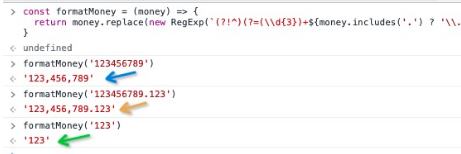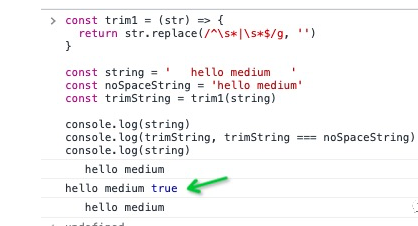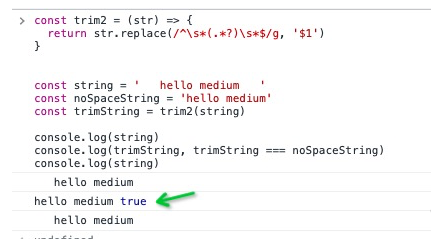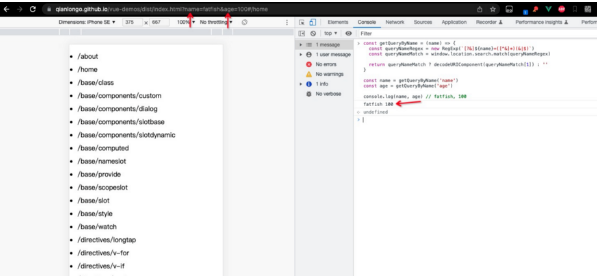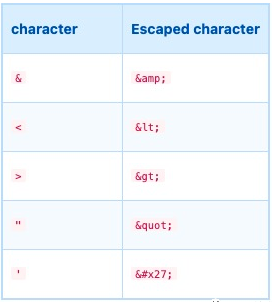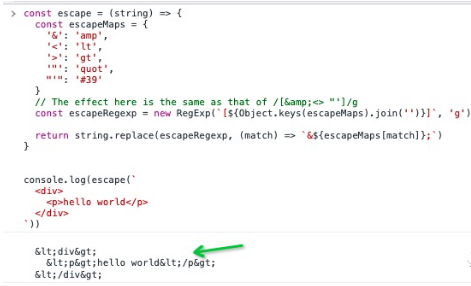14个每个前端开发人员都需要知道的正则表达式技巧
前言
如何看待正则表达式?我猜你会说它太晦涩难懂,我对它根本不感兴趣。是的,我曾经和你一样,认为我这辈子都学不会。
但我们不能否认它真的很强大,我在工作中经常使用它,我总结了 15 个小窍门与大家分享。
如果你对它们是如何实现的感兴趣,非常欢迎你在评论区告诉我,我会再写一篇文章单独分析。
1、格式化货币
我经常需要格式化货币,它需要遵循以下规则:
123456789 => 123,456,789
123456789.123 => 123,456,789.123
const formatMoney = (money) => {
return money.replace(new RegExp(`(?!^)(?=(\\d{3})+${money.includes('.') ? '\\.' : '$'})`, 'g'), ',')
}
formatMoney('123456789') // '123,456,789'
formatMoney('123456789.123') // '123,456,789.123'
formatMoney('123') // '123'你可以想象如果没有正则表达式我们将如何做到这一点?
2、实现trim功能的两种方式
有时候我们需要去掉字符串的前导和尾随空格,使用正则表达式会很方便,我想和大家分享至少两种方式。
方式一
const trim1 = (str) => {
return str.replace(/^\s*|\s*$/g, '')
}
const string = ' hello medium '
const noSpaceString = 'hello medium'
const trimString = trim1(string)
console.log(string)
console.log(trimString, trimString === noSpaceString)
console.log(string)太好了,我们删除了字符串 'string' 的前导和尾随空格。
方式二
const trim2 = (str) => {
return str.replace(/^\s*(.*?)\s*$/g, '$1')
}
const string = ' hello medium '
const noSpaceString = 'hello medium'
const trimString = trim2(string)
console.log(string)
console.log(trimString, trimString === noSpaceString)
console.log(string)第二种方式,我们也实现了我们的目标。
3、解析链接上的搜索参数
我们还必须经常需要从链接中获取参数,对吧?
// For example, there is such a link, I hope to get fatfish through getQueryByName('name')
// url https://qianlongo.github.io/vue-demos/dist/index.html?name=fatfish&age=100#/home
const name = getQueryByName('name') // fatfish
const age = getQueryByName('age') // 100用正则表达式解决这个问题非常简单。
const getQueryByName = (name) => {
const queryNameRegex = new RegExp(`[?&]${name}=([^&]*)(&|$)`)
const queryNameMatch = window.location.search.match(queryNameRegex)
// Generally, it will be decoded by decodeURIComponent
return queryNameMatch ? decodeURIComponent(queryNameMatch[1]) : ''
}
const name = getQueryByName('name')
const age = getQueryByName('age')
console.log(name, age) // fatfish, 1004、驼峰式字符串
请将字符串转换为驼峰式,如下所示:
1. foo Bar => fooBar
2. foo-bar---- => fooBar
3. foo_bar__ => fooBar我的朋友们,没有什么比正则表达式更适合这个了。
const camelCase = (string) => {
const camelCaseRegex = /[-_\s]+(.)?/g
return string.replace(camelCaseRegex, (match, char) => {
return char ? char.toUpperCase() : ''
})
}
console.log(camelCase('foo Bar')) // fooBar
console.log(camelCase('foo-bar--')) // fooBar
console.log(camelCase('foo_bar__')) // fooBar5、将字符串的首字母转换为大写
请将 hello world 转换为 Hello World。
const capitalize = (string) => {
const capitalizeRegex = /(?:^|\s+)\w/g
return string.toLowerCase().replace(capitalizeRegex, (match) => match.toUpperCase())
}
console.log(capitalize('hello world')) // Hello World
console.log(capitalize('hello WORLD')) // Hello World6、Escape HTML
防止 XSS 攻击的方法之一是进行 HTML 转义。规则如下:
const escape = (string) => {
const escapeMaps = {
'&': 'amp',
'<': 'lt',
'>': 'gt',
'"': 'quot',
"'": '#39'
}
// The effect here is the same as that of /[&<> "']/g
const escapeRegexp = new RegExp(`[${Object.keys(escapeMaps).join('')}]`, 'g')
return string.replace(escapeRegexp, (match) => `&${escapeMaps[match]};`)
}
console.log(escape(`
<div>
<p>hello world</p>
</div>
`))
/*
<div>
<p>hello world</p>
</div>
*/7、Unescape HTML
const unescape = (string) => {
const unescapeMaps = {
'amp': '&',
'lt': '<',
'gt': '>',
'quot': '"',
'#39': "'"
}
const unescapeRegexp = /&([^;]+);/g
return string.replace(unescapeRegexp, (match, unescapeKey) => {
return unescapeMaps[ unescapeKey ] || match
})
}
console.log(unescape(`
<div>
<p>hello world</p>
</div>
`))
/*
<div>
<p>hello world</p>
</div>
*/8、24小时制时间
请判断时间是否符合24小时制。
匹配规则如下:
- 01:14
- 1:14
- 1:1
- 23:59
const check24TimeRegexp = /^(?:(?:0?|1)\d|2[0-3]):(?:0?|[1-5])\d$/
console.log(check24TimeRegexp.test('01:14')) // true
console.log(check24TimeRegexp.test('23:59')) // true
console.log(check24TimeRegexp.test('23:60')) // false
console.log(check24TimeRegexp.test('1:14')) // true
console.log(check24TimeRegexp.test('1:1')) // true9、比赛日期格式
请匹配日期格式,例如 (yyyy-mm-dd, yyyy.mm.dd, yyyy/mm/dd),例如 2021-08-22、2021.08.22、2021/08/22。
const checkDateRegexp = /^\d{4}([-\.\/])(?:0[1-9]|1[0-2])\1(?:0[1-9]|[12]\d|3[01])$/
console.log(checkDateRegexp.test('2021-08-22')) // true
console.log(checkDateRegexp.test('2021/08/22')) // true
console.log(checkDateRegexp.test('2021.08.22')) // true
console.log(checkDateRegexp.test('2021.08/22')) // false
console.log(checkDateRegexp.test('2021/08-22')) // false10、以十六进制匹配颜色值
请从字符串中获取十六进制颜色值。
const matchColorRegex = /#(?:[\da-fA-F]{6}|[\da-fA-F]{3})/g
const colorString = '#12f3a1 #ffBabd #FFF #123 #586'
console.log(colorString.match(matchColorRegex))
// [ '#12f3a1', '#ffBabd', '#FFF', '#123', '#586' ]11、检查URL的前缀是HTTPS还是HTTP
const checkProtocol = /^https?:/
console.log(checkProtocol.test('https://medium.com/')) // true
console.log(checkProtocol.test('http://medium.com/')) // true
console.log(checkProtocol.test('//medium.com/')) // false12、请检查版本号是否正确
版本号必须采用 x.y.z 格式,其中 XYZ 至少为一位。
// x.y.z
const versionRegexp = /^(?:\d+\.){2}\d+$/
console.log(versionRegexp.test('1.1.1'))
console.log(versionRegexp.test('1.000.1'))
console.log(versionRegexp.test('1.000.1.1'))13、获取网页上所有img标签的图片地址
const matchImgs = (sHtml) => {
const imgUrlRegex = /<img[^>]+src="((?:https?:)?\/\/[^"]+)"[^>]*?>/gi
let matchImgUrls = []
sHtml.replace(imgUrlRegex, (match, $1) => {
$1 && matchImgUrls.push($1)
})
return matchImgUrls
}
console.log(matchImgs(document.body.innerHTML))14、按照3-4-4格式划分电话号码
let mobile = '18379836654'
let mobileReg = /(?=(\d{4})+$)/g
console.log(mobile.replace(mobileReg, '-')) // 183-7983-6654- End -
